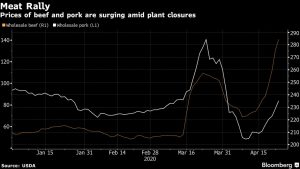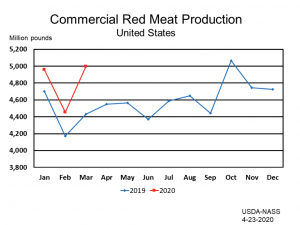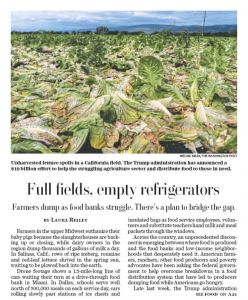Meat Shortages “Dangerously Close,” as COVID-19 Induced Supply Chain Bottlenecks Persist
Bloomberg writers Michael Hirtzer and Tatiana Freitas reported recently that, “Plant shutdowns are leaving the U.S. dangerously close to meat shortages as coronavirus outbreaks now spread to suppliers across the Americas.
Almost a third of U.S. pork capacity is down, the first big poultry plants closed on Friday and experts are warning that domestic shortages are just weeks away. Brazil, the world’s No. 1 shipper of chicken and beef, saw its first major closure with the halt of a poultry plant owned by JBS SA, the world’s biggest meat company. Key operations are also down in Canada, the latest being a British Columbia poultry plant.
“While hundreds of plants in the Americas are still running, the staggering acceleration of supply disruptions is now raising questions over global shortfalls. Taken together, the U.S., Brazil and Canada account for about 65% of world meat trade.”

The Bloomberg writers pointed out that, “Prices are surging. U.S. wholesale beef touched a record this week, and wholesale pork soared 29%, the biggest weekly gain since 2012.”
Taylor Telford and Kimberly Kindy reported on the front page of Sunday’s Washington Post that, “Because of outbreaks of the novel coronavirus, over the past several weeks Tyson, JBS and Smithfield have closed 15 plants, devastating rural communities and threatening the nation’s supply of beef and pork. Industry analysts say production is already down by at least 25 percent.”

Meanwhile, Donnelle Eller reported on Saturday at The Des Moines Register Online that, “The federal government says it will help U.S. pork producers find new processors — or potentially destroy thousands of pigs that have backed up on farms — because large meatpacking plants have slowed or closed due to COVID-19.”
The Register article stated that, “The U.S. Department of Agriculture said late Friday that livestock and poultry producers face an ‘unprecedented emergency‘ after large processing plants have slowed or closed as more than 6,000 U.S. meatpacking workers have become ill or been exposed to the coronavirus.

ChuckGrassley
✔@ChuckGrassley
Iowa proudly leads in pork but w meat packing plant closures from covid-19 many hogs have nowhere to go & farmers are facing a crisis Encouraging announcement last night from USDA for help on depopulation + disposal methods if necessary but govt needs 2b ready for more action2:45 PM – Apr 25, 2020
“The USDA said it would work with state officials and veterinarians to help farmers ‘identify potential alternative markets … and if necessary, advise and assist on depopulation and disposal methods.’”

Joni Ernst
✔@SenJoniErnst
Iowa’s pork industry is in dire straits. After speaking with @SecretarySonny this week, I’m thankful to see him put plans in place to provide guidance, support, and resources to Iowa pork producers during this trying time. https://www.ernst.senate.gov/public/index.cfm/press-releases?ID=31702ECE-46DF-48F6-9D84-8793C685C6AA …

Ernst Statement on USDA’s Plans to Support Iowa Pork Producers Affected by Plant Closures
RED OAK, Iowa – U.S. Senator Joni Ernst (R-IA), chairman of the Senate Agriculture Subcommittee on Rural Development and Energy, issued the following statement after the U.S. Department of Agricult…
ernst.senate.gov
And regarding federal meat inspectors, Bloomberg writers Deena Shanker, Lydia Mulvany, and Mike Dorning reported recently that, “Almost 1,000 U.S. Department of Agriculture food inspectors, or about 15% of the workforce, are off the job as the coronavirus outbreak left workers sick, quarantined or facing a high risk to health, figures provided by the union showed.”
With respect to the food supply chain, Donnelle Eller reported on the front page of Friday’s Des Moines Register that, “The breakdown in the U.S. food chain — from shifting consumer demand to Midwest meatpacking plant slowdowns and closures as employees have become ill — is creating hardship for Iowa farmers and workers.
“And that disruption will show up in U.S. grocery stores, experts say.”

The Register article noted that, “[Lee Schulz, an Iowa State University agriculture economist] said the U.S. expects record supplies of beef, pork and poultry this year, a fact that’s unlikely to change even with the supply chain disruption.
“‘The challenge here is the bottlenecks in the supply chain, getting the animals from the farm to the processor,’ he said. ‘And then getting that product to the consumers at the grocery store.’”

And Laura Reiley reported on the front page of Saturday’s Washington Post that, “The distribution breakdowns have affected most sectors of American agriculture: dairy, produce, beef and pork.
After an initial spike in demand in early March as retail shoppers panic-purchased milk at the grocery store, dairy farmers saw a precipitous drop in demand. With schools and restaurants closed, the dairy industry lost its major customers: Half of the nation’s cheese and 60 percent of butter goes to restaurants, and 7 percent of fluid milk is used in the school nutrition program.
“Milk prices dropped 20 percent, to their lowest point in a dozen years.”
The Post article added that, “For beef and pork, the supply-chain bottlenecks occurred because of widely reported covid-19 outbreaks that have shut down many meat-processing plants.
“And with their food-service customers shut down temporarily, pork producers have been unable to pivot easily to exports because U.S. ports have slowed or shut down, and shipping containers are marooned in China, which has endured its own pandemic shutdown, according to Dallas Hockman, vice president of industry relations for the National Pork Producers Council.”
Source: Keith Good, Farm Policy News


